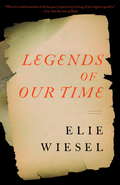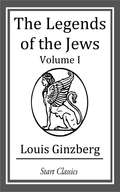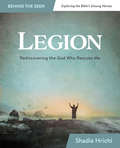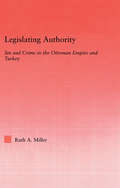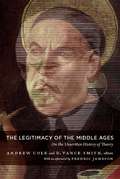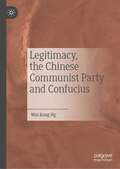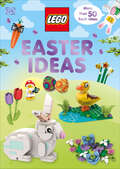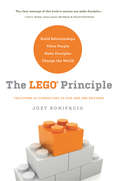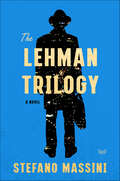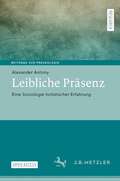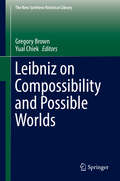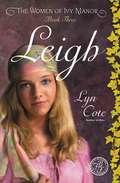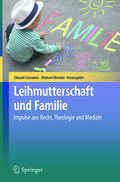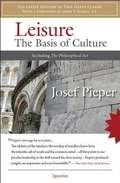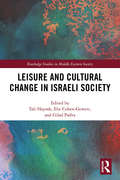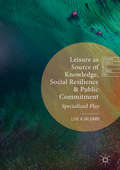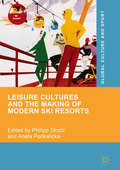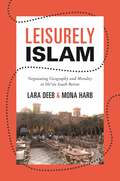- Table View
- List View
Legends of Our Time
by Elie WieselA collection of tales immortalizing the heroic deeds and visions of people Wiesel knew during and after World War II.From the Trade Paperback edition.
The Legends of the Jews
by Louis GinzbergTo this day Legends of the Jews remains a most remarkable and comprehensive compilation of stories connected to the Hebrew Bible. It is an indispensable reference on that body of literature known as Midrash, the imaginative retelling and elaboration on Bible stories in which mythological tales about demons and magic co-exist with moralistic stories about the piety of the patriarchs. Legends is the first book to which one turns to learn about the postbiblical understanding of a biblical episode, or to discover the source for biblical legends that cannot be traced directly to the Bible. It is also the first place to find the answers to such questions as: on what day was Abraham born; what was Moses' physical appearance, or what was the name of Potiphar's wife. Launched in 1901 by The Jewish Publication Society, the original project began as a single volume of 1,000 pages but grew much larger by 1938, when the seventh volume containing the indexes was finally published. Louis Ginzberg was 28 years old when Henrietta Szold, secretary of the Society, prepared the contract for what was conceived as a small, popular volume on Jewish legends. As the scion of two distinguished rabbinical families, Ginzberg studied in the great Lithuanian yeshivot of Telz and Slobodka. Later he received his secular education at Strassburg and Heidelberg universities. This combination of religious and secular learning enabled him to pursue with great passion the wide-ranging roots of Jewish legend. Ginzberg believed that Jewish legend was both earlier and greater than what was represented in the Talmud and midrashic collections--the primary Rabbinic sources. And so he scoured Jewish, Christian, Islamic, and Oriental sources to rediscover the fine threads of Jewish legend. The result was a masterpiece: a single, coherent collection of legends that follows the biblical narrative, accompanied by detailed notes that reveal a complex subtext of often intersecting and multi-layered levels of influence, borrowed notions, and interpretive commentaries.
The Legends of the Jews, Volume 1
by Louis Ginzberg Henrietta SzoldThe Legends of the Jews, Volume 1
Legible Religion
by Duncan MacraeScholars have long separated a few privileged "religions of the Book" from faiths lacking sacred texts, including ancient Roman religion. Looking beyond this distinction, Duncan MacRae delves into Roman treatises on the nature of gods and rituals to grapple with a central question: what was the significance of books in a religion without scripture?
Legion: Rediscovering the God Who Rescues Me
by Shadia HrichiWitness the Divine Power of Jesus That Transforms a Demoniac into a Disciple.Legion—a man known only by the name of the demons that tormented him— is not a famous person in the Bible. Do you know his story? Climb into the boat and follow Jesus on his mission of rescue, and then celebrate the ways that God’s sovereign power and relentless love can bring deliverance to any wounded soul, including yours.Sometimes we feel trapped and alone. But there is nothing that God cannot overcome. Through this six-week, in-depth Bible study, you will discover how God is working to bring redemption and deliverance to your life.
Legislating Authority: Sin and Crime in the Ottoman Empire and Turkey
by Ruth MillerLegislation Authority addresses issues of law, state violence, and state authority within the Ottoman and Turkish context.
The Legitimacy of the Middle Ages: On the Unwritten History of Theory
by Andrew Cole D. Vance SmithThis collection of essays argues that any valid theory of the modern should--indeed must--reckon with the medieval. Offering a much-needed correction to theorists such as Hans Blumenberg, who in his Legitimacy of the Modern Age describes the "modern age" as a complete departure from the Middle Ages, these essays forcefully show that thinkers from Adorno to Žižek have repeatedly drawn from medieval sources to theorize modernity. To forget the medieval, or to discount its continued effect on contemporary thought, is to neglect the responsibilities of periodization. In The Legitimacy of the Middle Ages, modernists and medievalists, as well as scholars specializing in eighteenth-, nineteenth-, and twentieth-century comparative literature, offer a new history of theory and philosophy through essays on secularization and periodization, Marx's (medieval) theory of commodity fetishism, Heidegger's scholasticism, and Adorno's nominalist aesthetics. One essay illustrates the workings of medieval mysticism in the writing of Freud's most famous patient, Daniel Paul Schreber, author of Memoirs of My Nervous Illness (1903). Another looks at Michael Hardt and Antonio Negri's Empire, a theoretical synthesis whose conscientious medievalism was the subject of much polemic in the post-9/11 era, a time in which premodernity itself was perceived as a threat to western values. The collection concludes with an afterword by Fredric Jameson, a theorist of postmodernism who has engaged with the medieval throughout his career. Contributors: Charles D. Blanton, Andrew Cole, Kathleen Davis, Michael Hardt, Bruce Holsinger, Fredric Jameson, Ethan Knapp, Erin Labbie, Jed Rasula, D. Vance Smith, Michael Uebel
Legitimacy, the Chinese Communist Party and Confucius
by Wai Kong NgThis book explores the use of Confucianism by the Chinese Communist Party in its assertion of political legitimacy. Confucian thought offers an enduring framework for political legitimacy in East Asian societies, including China. All states strive to acquire legitimacy, and despite once denouncing Confucianism as the remnants of feudal poison, the Party is turning towards Confucianism as part of its legitimation efforts. This suggests that the Party is suffering from an ideological void in terms of legitimacy and legitimation due to the diminishing relevance of Marxism in Chinese societal practices. The book will devise a non-liberal legitimacy framework, drawing on the ideas of Habermas and Bernard Williams, to examine the legitimacy of the Party, and use an analysis of the elite discourse to determine the nature of the Confucian turn, in a sharp polemic that will interest scholars of Chinese politics, of the role of traditional beliefs in Asian modernity, and in China's future.
LEGO Easter Ideas: With an Exclusive LEGO Springtime Model (Lego Ideas)
by Jessica Farrell Hannah DolanThis edition does not include a modelPut a spring in your step with more than 50 Easter themed LEGO® build ideas!Use your LEGO collection to build adorable baby animals, create a colourful basket of eggs, make sunny spring scenes, blooming flowers, and much more. Plus, challenge your friends and family to egg-cellent LEGO Easter games. These inspirational models are sure to keep you and your family busy throughout the spring season. ©2024 The LEGO Group.
LEGO Holiday Ideas: More than 50 Festive Builds
by DKMore than 50 festive building ideasNeed to keep a little LEGO® fan entertained over the holiday season? Packed full of original, inspirational build ideas for LEGO holiday decorations, gifts and games, this is perfect for LEGO fans and children who enjoy building and crafting. From fun tree decorations, a cute family of penguins, and a snowflake garland to quick LEGO building challenges suitable for the whole family, you won't run out of ideas with this book over the holiday season. 50 winter holiday-themed activities will keep kids busy counting down to the holidays and throughout the winter holidays.©2019 The LEGO Group
The LEGO Principle: The Power of Connecting to God and One Another
by Joey BonifacioLove God. Love Your Neighbor. Jesus called these the two most important commandments of all time. When He said this, He was making something clear to His listeners then as He does now: in life, it all boils down to our relationships. Using the example of LEGO®, a company that has been transforming the way people play for more than fifty years, Joey Bonifacio shows you how to make a difference, one connection at a time.
The Lehman Trilogy: A Novel
by Stefano MassiniBasis for the 2022 'Tony Award Best Play' winnerMagnificent in scope, internationally lauded, and transcendent, the novel in verse that inspired the sensational West End and Broadway play of the same name. The Lehman Trilogy follows the epic rise and fall of three generations of that infamous family and through them tells the story of American ambition and hubris. After leaving his native Bavaria, Henry Lehman arrives in America determined to make a better life. Sensing opportunity in the Deep South, he opens a textile shop in Alabama, laying the foundation for a dynasty that will come to dominate and define modern capitalism. Emanuel and his brother Mayer begin investing in anything and everything that will turn a profit, from cotton to coal to railroads to oil to airplanes—even at the expense of the very nation that forged them. Spanning three generations and 150 years, The Lehman Trilogy is a moving epic that dares to tell the story of modern capitalism through the saga of the Lehman brothers and their descendants. Surprising and exciting, brilliant and inventive, Stefano Massini’s masterpiece—like Hamilton—is a story of immigration, ambition, and success; it is the story of America itself from a daring and original perspective.Translated from the Italian by Richard Dixon
Leibliche Präsenz: Eine Soziologie holistischer Erfahrung (Beiträge zur Praxeologie / Contributions to Praxeology)
by Alexander AntonyIn welcher Hinsicht können körperlich-leibliche Erfahrungen als Teil sozialer Aktivitäten verstanden werden und wie kann man sie sozialwissenschaftlich untersuchen? Unter Rückgriff auf den klassischen Pragmatismus, insbesondere John Dewey, und soziologische Praxistheorien leistet Alexander Antony einen Beitrag zur Beantwortung dieser Fragen. Er entwickelt eine Soziologie leiblicher Praxis, welche Sozialtheorie, methodologische Reflexion und die Erforschung der Produktion ge- und erlebter Körperlichkeit miteinander verschränkt. Empirisch widmet sich das Buch aus einer diskursanalytischen und ethnographischen Perspektive der Praktik der Atemarbeit, einem „ganzheitlichen“ Therapie- und Selbsterfahrungsangebot. Die Atemarbeit zielt darauf, eine bewusst erlebte leibliche Selbstbezüglichkeit zu etablieren, um derart körperliches, psychisches und seelisch-spirituelles Wohlbefinden zu befördern. Auf unterschiedlichen Analyseebenen spürt der Autor der Frage nach, wie individuelles leibliches Erleben und die diskursive und soziomaterielle Produktion von Erfahrungssituationen zusammenspielen. Die zentrale Einsicht: Sozialität geht buchstäblich unter die Haut.Dies ist ein Open-Access-Buch.
Leibniz, God and Necessity
by Michael V. GriffinLeibniz states that 'metaphysics is natural theology', and this is especially true of his metaphysics of modality. In this book, Michael V. Griffin examines the deep connection between the two and the philosophical consequences which follow from it. Grounding many of Leibniz's modal conceptions in his theology, Griffin develops a new interpretation of the ontological argument in Leibniz and Descartes. This interpretation demonstrates that their understanding God's necessary existence cannot be construed in contemporary modal logical terms. He goes on to develop a necessitarian interpretation of Leibniz, arguing that Leibniz, like Spinoza, is committed to the thesis that everything actual is metaphysically necessary, but that Leibniz rejects Spinoza's denial of God's moral perfection. His book will appeal to scholars of early modern philosophy and philosophers interested in modal metaphysics and the philosophy of religion.
Leibniz on Compossibility and Possible Worlds
by Gregory Brown Yual ChiekThis volume brings together a number of original articles by leading Leibniz scholars to address the meaning and significance of Leibniz's notions of compossibility and possible worlds. In order to avoid the conclusion that everything that exists is necessary, or that all possibles are actual, as Spinoza held, Leibniz argued that not all possible substances are compossible, that is, capable of coexisting. In Leibniz's view, the compossibility relation divides all possible substances into disjoint sets, each of which constitutes a possible world, or a way that God might have created things. For Leibniz, then, it is the compossibility relation that individuates possible worlds; and possible worlds form the objects of God's choice, from among which he chooses the best for creation. Thus the notions of compossibility and possible worlds are of major significance for Leibniz's metaphysics, his theodicy, and, ultimately, for his ethics. Given the fact, however, that none of the approaches to understanding Leibniz's notions of compossibility and possible words suggested to date have gained universal acceptance, the goal of this book is to gather a body of new papers that explore ways of either refining previous interpretations in light of the objections that have been raised against them, or ways of framing new interpretations that will contribute to a fresh understanding of these key notions in Leibniz's thought.
Leigh: Book Three in The Women of Ivy Manor
by Lyn CoteThe third in s series, this book focuses on a young journalist in the 1960s who becomes involved in the civil right movement and antiwar protests.
Leihmutterschaft und Familie: Impulse aus Recht, Theologie und Medizin
by Edward Schramm Michael WermkeDas Buch betrachtet das Thema Leihmutterschaft aus einer breit angelegten, interdisziplinären Perspektive. In Deutschland ist die Leihmutterschaft verboten, in vielen anderen Ländern legal. Viele Menschen erfüllen sich den Wunsch nach einem Kind daher im Wege einer Leihmutterschaft im Ausland. Das Buch nimmt dies zum Anlass, aktuelle Erkenntnisse und Impulse aus der Rechtswissenschaft, Theologie, Soziologie, kindlichen Entwicklungspsychologie, Medizin, Genetik und Philosophie zu diesem Phänomen aufzugreifen und zu analysieren. Im Mittelpunkt steht die Frage, inwiefern sich das Wohl des Kindes, die Interessen der Leihmütter sowie die Bedürfnisse der Wunscheltern in der deutschen Rechtsordnung, der sozialen Wirklichkeit und den kirchlichen Institutionen widerspiegeln.
Leisure: The Basis of Culture and The Philosophical Act
by Josef Pieper"One of the most important philosophy titles published in the twentieth century, Josef Pieper's Leisure, the Basis of Culture is more significant, even more crucial, today than it was when it first appeared more than fifty years ago. This special new edition now also includes his little work The Philosophical Act. Leisure is an attitude of the mind and a condition of the soul that fosters a capacity to perceive the reality of the world. Pieper shows that the Greeks and medieval Europeans, understood the great value and importance of leisure. He also points out that religion can be born only in leisure - a leisure that allows time for the contemplation of the nature of God. Leisure has been, and always will be, the first foundation of any culture. Pieper maintains that our bourgeois world of total labor has vanquished leisure, and issues a startling warning: Unless we regain the art of silence and insight, the ability for non-activity, unless we substitute true leisure for our hectic amusements, we will destroy our culture - and ourselves. "Pieper's message for us is plain. . . . The idolatry of the machine, the worship of mindless know-how, the infantile cult of youth and the common mind - all this points to our peculiar leadership in the drift toward the slave society. . . . Pieper's profound insights are impressive and even formidable. "- New York Times Book Review "Pieper has subjects involved in everyone's life; he has theses that are so counter to the prevailing trends as to be sensational; and he has a style that is memorably clear and direct. " - Chicago Tribune"
Leisure and Cultural Change in Israeli Society (Routledge Studies in Middle Eastern Society)
by Tali Hayosh Elie Cohen-Gewerc Gilad PadvaProviding an inclusive, yet multi-layered perspective on leisure cultures in dynamic hegemonic, subcultural, and countercultural communities, this volume investigates the disciplinary and interdisciplinary aspects of leisure studies in the age of mass migration, nationalism, cultural wars, and conflicted societies in Israel. The Israeli society struggles with complicated geopolitical, intercultural, economic and security conditions since the establishment of the State of Israel. Consequently, the emergent leisure cultures in Israel are vibrant, diversified, exuberant and multifaceted, oscillating between Western and Middle Eastern tendencies. The chapters in this edited volume reflect dramatic influences of globalization on Israeli traditions, on one hand, and emergent local practices that reflect a communal quest of originality and authenticity, on the other hand. This book opens up a critical perspective on the tension between contested leisure cultures which are interconnected with spatial and temporal changes and interchanges. Examining leisure as a part of social, interethnic, physical, gendered and sexual changes, the volume is a key text for scholars and students interested in leisure culture, Israeli society, education, cultural and media studies and the Middle East.
Leisure as Source of Knowledge, Social Resilience and Public Commitment: Specialized Play (Leisure Studies in a Global Era)
by Lise KjølsrødThis book provides a bottom-up contribution to contemporary political and cultural theory, by presenting leisure activities as a democratic arena. Where much of the existing literature on leisure and play views participants as consumers, Kjølsrød presents these people as producers, who conduct micro-processes of social protection, become informed and skilled, and achieve influence via complex leisure. Through an in-depth analysis of a range of leisure practices, this book demonstrates where players belong in the political landscapes of modern democracies. Leisure as Source of Knowledge, Social Resilience and Public Commitment will be of interest to students and scholars of leisure, recreational, and cultural studies, as well as sociologists, anthropologists and political scientists studying identity construction, emerging social worlds, and novel channels of political participation in contemporary society.
Leisure Cultures and the Making of Modern Ski Resorts (Global Culture and Sport Series)
by Philipp Strobl Aneta PodkalickaThis edited volume offers an historical perspective on the creation of a global mass industry around skiing. By focusing on the ski resort as loci par excellence for global exchange, the contributors consider the development of skiing around the world during the crucial post-war years. With its global lens, Leisure Cultures and the Making of Modern Ski Resorts highlights both commonalities and differences between countries. Experts across various fields of research cover developments across the ski-able world, from Europe, Asia and America to Australia. Attention to media and material cultures reveals an insight into global fashions, consumption and ski cultures, and the impact of mainstream media in the 1960s and 1970s. This global and interdisciplinary approach will appeal to history, sociology, cultural and media research scholars interested in a cultural history of skiing, as well as those with more broad interests in globalization, consumption research, and knowledge transfer.
Leisurely Islam: Negotiating Geography and Morality in Shi‘ite South Beirut (Princeton Studies in Muslim Politics #49)
by Lara Deeb Mona HarbHow the rise of leisure is changing contemporary LebanonSouth Beirut has recently become a vibrant leisure destination with a plethora of cafés and restaurants that cater to the young, fashionable, and pious. What effects have these establishments had on the moral norms, spatial practices, and urban experiences of this Lebanese community? From the diverse voices of young Shi'i Muslims searching for places to hang out, to the Hezbollah officials who want this media-savvy generation to be more politically involved, to the religious leaders worried that Lebanese youth are losing their moral compasses, Leisurely Islam provides a sophisticated and original look at leisure in the Lebanese capital.What makes a café morally appropriate? How do people negotiate morality in relation to different places? And under what circumstances might a pious Muslim go to a café that serves alcohol? Lara Deeb and Mona Harb highlight tensions and complexities exacerbated by the presence of multiple religious authorities, a fraught sectarian political context, class mobility, and a generation that takes religion for granted but wants to have fun. The authors elucidate the political, economic, religious, and social changes that have taken place since 2000, and examine leisure's influence on Lebanese sociopolitical and urban situations.Asserting that morality and geography cannot be fully understood in isolation from one another, Leisurely Islam offers a colorful new understanding of the most powerful community in Lebanon today.
